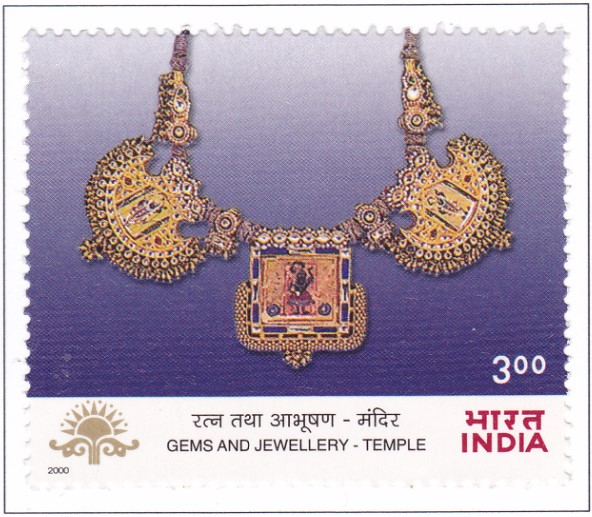In December of 2000, the Indian Government released six postage stamps on gems and jewellery as a part of Indepex-Asiana 2000. The XIV Asian international exhibition was a tribute to 50 years of India being a republic at the turn of the new millennium. As India celebrates 75 years of Independence from the British rule (Azadi ka Amrit Mahotsav) in August this year, I wanted to talk about these stamps. Designed by Alka Sharma and Kamaleshwar Singh, the stamps showcase six pieces of jewellery displayed at the National Museum in New Delhi (in 2000). Here are some facts about these six stamps. Coincidently, the stamps are displayed on the homepage of India Post at the moment.

Commemorative postage stamps
Commemorative stamps mark or celebrate an occasion, a place, traditions and practices or an achievement. They could also pay tribute to a person, a small group of people (like a sports team) or a large community for their contribution to the growth and welfare of the country. They could also record the beauty of elements of nature or recognise a natural or man-made wonder.
Indian Postage stamps on jewellery
Listed under the Gems and jewellery series, these stamps were printed using the Photogravure method. Each stamp has a face value of Rs.3 (three INR). As collectables, these stamps sell as a set on Amazon for Rs.480.

Bead necklace from Ancient India
This stamp is a nod to India’s ancient history (2600 -1900 BCE). These beads of jade, banded agate, and gold are from the Indus-Saraswati valley Harappan civilisation. They show India’s prowess as a bead making centre and its splendor as a bead wearing culture. Such beads can be seen on bronze and terracotta statutes such as recovered from that area. However, at a talk held a few months ago, I heard experts discuss how beads were divided between India and Pakistan after the partition while setting up the National museum. Therefore, the current version might have been strung only in 1949 (or even later) when the National museum was set up.

Gold Necklace
This gold necklace is from Taxila in Sirkap, which in current day Pakistan. Sirkap was an ancient metropolis and home to Bactrians, Greeks, Scythians and once a part of India. Similar to the Harappan bead necklace above, this one too was acquired by the museum after partition. This gold necklace from the 1st century CE is set with garnets, lapis lazuli and turquoise. The Greek influence is evident in the style of the piece and the stone setting is charecteristic of that area. However, it is the granulation on the round heads that makes this necklace a class apart.

Turban Ornament – Sarpech
This sarpech is a 19th century Mughal head ornament. There is one Columbian emerald engraved to look like a chrysanthemum. Two other engraved emerald squares surrounded by diamonds flank it. In addition, it has six large emerald bead drops and rows of emeralds and diamonds on the tapering scroll aigrette. The ornament will be secured on a turban with a cord that is knotted to the ends.

Bridal – Thali
This stamp features a Thali – a wedding pendant necklace. As I discussed in my post on thali – thirumangalyam, this particular style is worn by Nagarathaar Chettiar community in Tamil Nadu. The focal looks like five fingers and symbolises protection similar to other hand amulets seen around the world. As Dr. Usha Balakrishnan catalogues in her book Alamkara, the focal is modeled on crab claws or tiger paw and is from the 19th century. I personally think that this piece has been restrung as there will typically be four such pendants in the thali (Kaluthiru) with a more elaborate center focal.

Navaratna
Unlike the other Indian Postage stamps on jewellery, the one above is not based on a time period or a specific community. It is a stamp that showcases the beauty of navaratna. The nine gems are ruby, diamond, emerald, yellow sapphire, coral, blue sapphire, cat’s eye chrysoberyl, and hessonite. I have previously written about navaratna jewellery here. This particular necklace made of gold is from the 18th century.

Temple – picture jewellery
This fabulous piece of picture jewellery is from 19th century Udaipur, Rajasthan. It is set with white sapphires, rubies, emeralds and pearls. As a picture jewellery researcher, this piece showcasing three painted portraits of Srinathji is extremely important to me. Recently, jewellery historian, collector and dealer Mr. Mahendrasingh Bana of Bana Studio told me that jewellery with paintings of Srinathji were the earliest religious picture jewellery in India. They are an outcome of a significant migration that occurred during the rule of Mughal ruler Aurangazeb relating to the shrine of Srinathji at Nathdwara.
I hope you enjoyed this post on Indian Postage stamps on jewellery. I am curious to know if jewellery based stamps exist in other countries. If there are such stamps in your country, could you please share the details in the comments?
I hope you find it interesting
Cheers


What do you think?